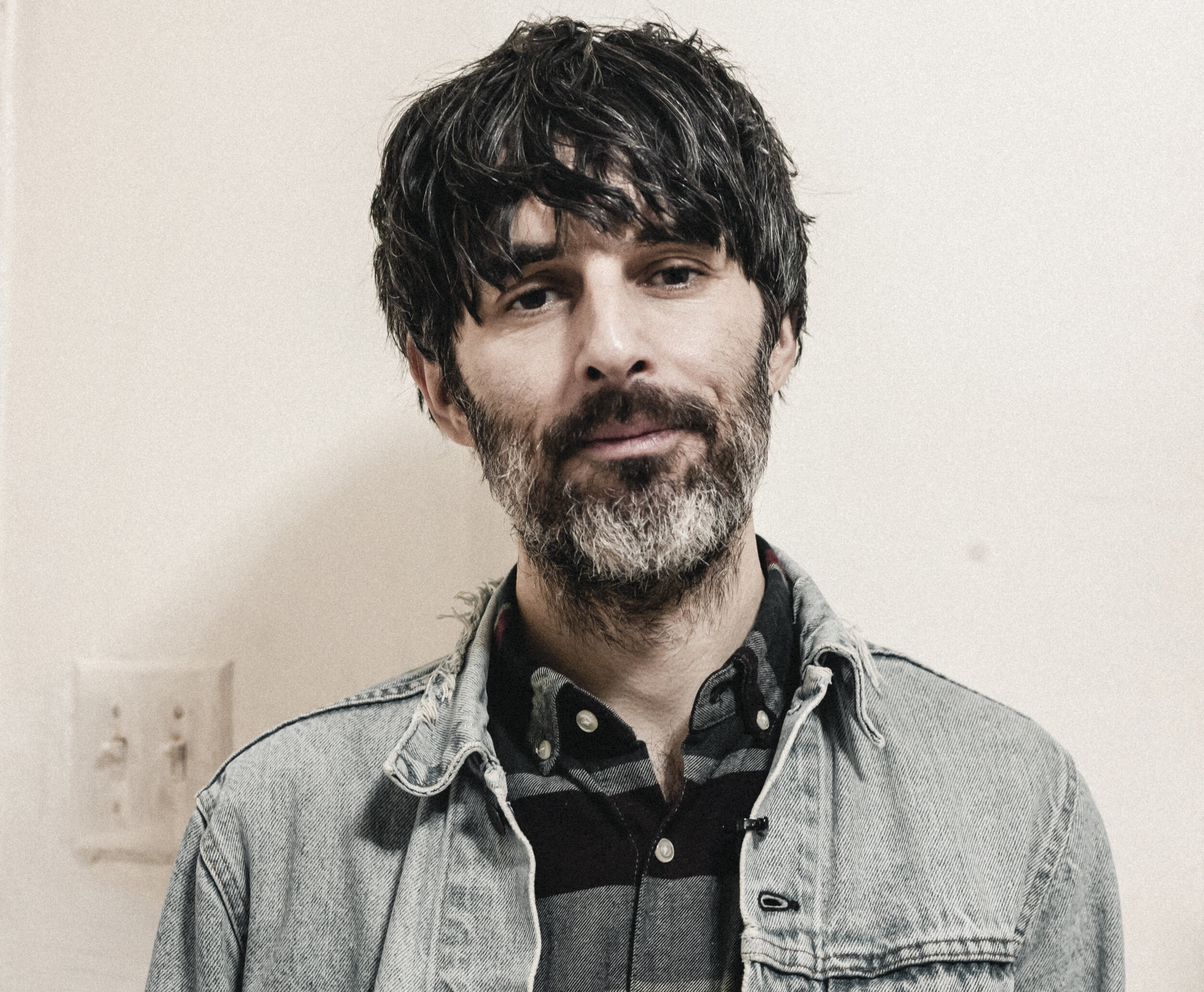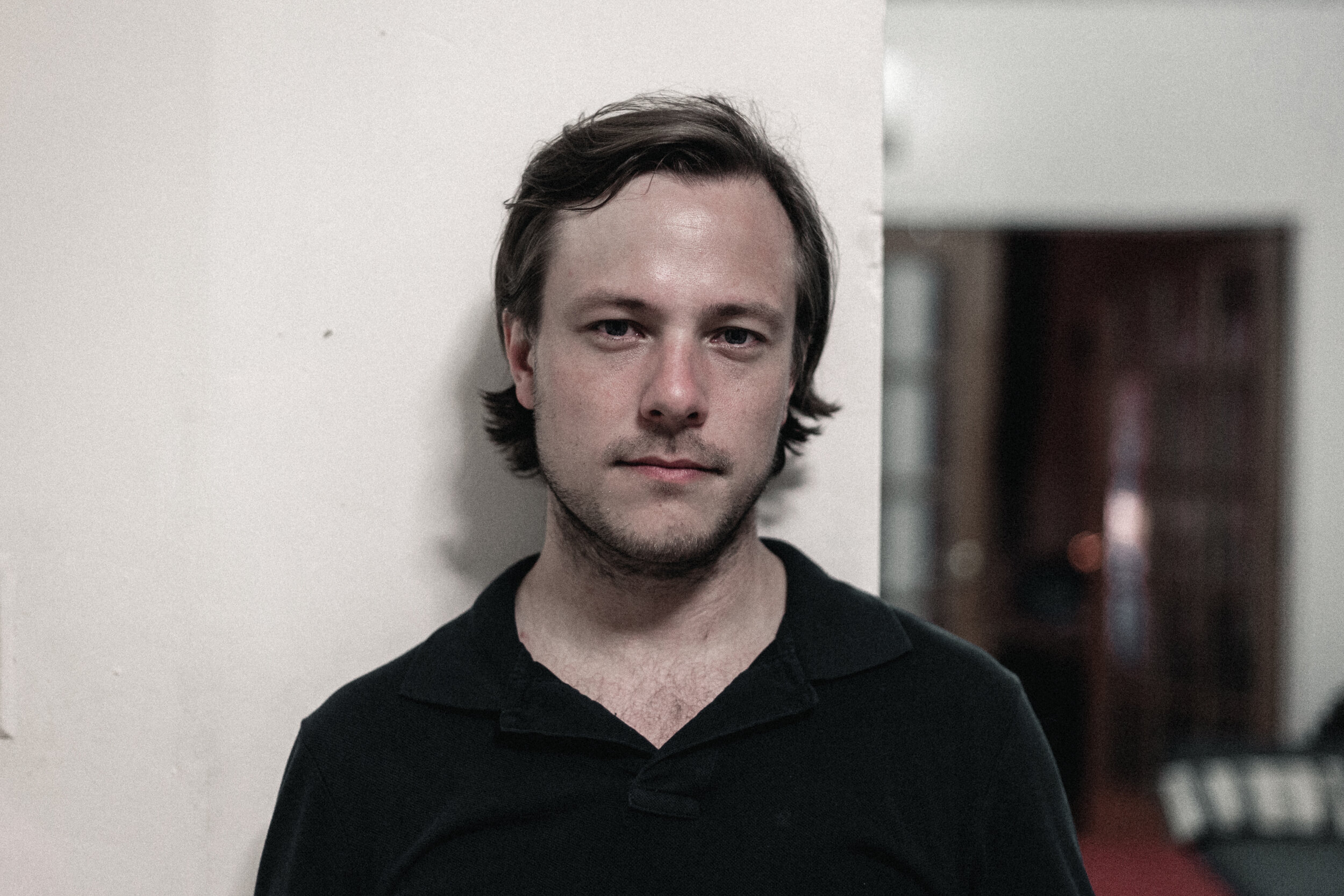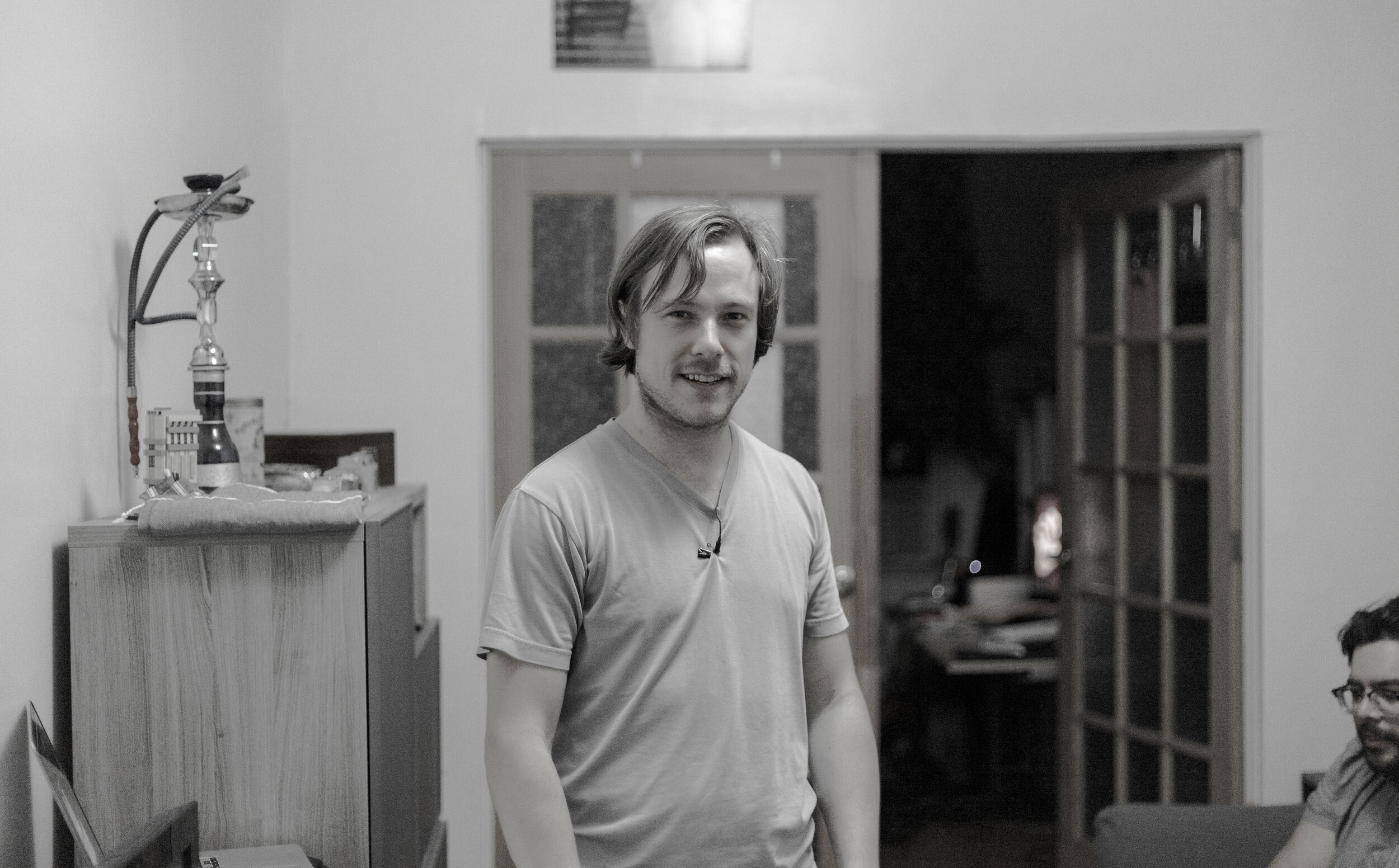Transcript:
00;00;00;11 - 00;00;21;05
Justin Joseph Hall:
Welcome to Feature & a short. Feature & a short is a monthly screening hosted by Fourwind Films, where an appointed contributor presents their chosen feature motion picture and short movie. The only condition for screening selection, presenter must have been directly involved with one picture, but not the other. I'm Justin Joseph Hall.
Gladys Mae Murphy is our guest and she works on HBO projects all the time. All of which are amazing. She was co-editor on the Oscar-winning Crisis Hotline, which won the Academy Award for Documentary Short several years ago. The movie that we watched was another Oscar-nominated film that she worked on with Geof Bartz called Prison Terminal: The Last Days of Private Jack Hall.
00;00;45;08 - 00;01;12;02
Gladys Mae Murphy:
So Prison Terminal is a film that was shot over the course of six months by a director who wanted to experience what hospice was like in prisons where people are serving life sentences. Edgar Barens was the director. He got his certificate to be able to, you know, practice as a caretaker. He worked with the prisoners for a week just to get them used to his presence and then he brought out the camera and just followed everything for six months.
He lived in the basement across the street. He had a very depressing time. And this movie is very, very depressing and, yeah. But it's, it's about a hospice, so I'm sorry if it, yeah, we all know what the ending is going to be.
00;01;29;28 - 00;01;40;27
Justin Joseph Hall:
So after the film, we had a short discussion and Gladys had a ton of insight, not only on her process, but also the effort that the director put into creating this film.
00;01;40;28 - 00;01;46;05
Justin Joseph Hall:
For those of you who don't know Geof Bartz, he’s a very famous documentary editor.
00;01;46;12 - 00;02;11;11
Gladys Mae Murphy:
20 years at HBO as a supervising editor. And so, when there's a film that it comes into HBO that's already been cut and needs a little help, they give it to Geof. Maybe almost a decade ago, I was hired to be his assistant, and after a year of hardcore assistant work, I escaped to the country Colombia and said I wasn't coming back for six months.
And he called me. He was like, I need you back. And I was like, I'm not coming back. And I said, I want to cut soon and he gave me a scene to cut in a different movie that was hard. It was about how they kill dogs in shelters. It was that scene, and I was so excited that I was even allowed to cut for anything for HBO and so I did it, and he kept me on and one of our next projects was this Prison Terminal.
And we cut it over the winter. We both gained so much weight because it was just so depressing. And we both don't smoke cigarettes so our outlet was like, oh, let's go to the vending machine and we did that maybe like five times a day just watching the dailies. And there was one, it was shot on tape, many DVD’s, and we would watch just one tape a day, and it was a countdown to Christmas. And he said, oh, this is a tape where Jack Hall dies. Let's not start the Christmas season with this. I was like, great idea. And then so, like, I don't know, 2013, 2014 rolls in and the first tape we pop in is to watch Jack Hall die.
And, it wasn't that hard to cut. It was just hard to watch. And it's still hard to watch. I haven't seen it in years and it still brings back feelings. So, Geof Bartz cut the next film, Pumping Iron, about bodybuilding and helped Arnold Schwarzeneggerbecome a household name. And I watched that film when I was 18 in California and not knowing I was ever going to meet anyone from Pumping Iron and when I walked into Geof Bartz’s office, he had a poster Pumping Iron. I'm like, oh, that's cool. He said, yeah. And I didn't, I did not look at his entire history.
Audience:
Yeah.
(laughter)
Gladys Mae Murphy:
He has like 100 films and he's like, this is the film I cut. I said, what?
00;04;15;15 - 00;04;16;13
Justin Joseph Hall:
But you’ve already seen it?
00;04;16;20 - 00;04;44;28
Gladys Mae Murphy:
I've seen it when I was 18 and, like, a decade later, I meet Geof and he, he said. After that, like, after that film came out, there was so much buzz. He was so excited. He was a freelancer. He's like, oh, I'm now, I'm going to get the job offers. He got nothing for seven months. And his first job editing after seven months of unemployment was editing an industrial film on how to grow green beans. And he said he was so excited and… this is his inspiration. I was like, wow, you did Pumping Iron and no one hired you after that?
00;04;55;05 - 00;05;15;22
Justin Joseph Hall:
Yeah, yeah, it’s, it's cool. It, the other thing I was wondering is, like, when you got the footage, when you worked with Geof, especially on this film, there's like some of the least amount of credits I’ve seen in the film on that. It's pretty crazy. So what did Geof, if you, that you're putting this with him? Or how, what was your working relationship and how did you deal with the footage when you first got it?
00;05;20;29 - 00;05;46;18
Gladys Mae Murphy:
When we first got the footage, it was over 300 hours and we knew it was a short and we said, we doubt everything that isn't related to Jack Hall, because he did shoot other people in the hospice who weren't as dynamic as Jack. And, he gave us maybe 80 hours of tapes to go through. And what Geof likes to do is to have everyone sit in a room and watch all 80 hours.
Audience:
Everyone...
Gladys Mae Murphy:
Me, the director and Geof, and the director was the only crew member. He was sound, and, and, I don't know if you noticed, but it has this weird tint on it because he never set his white balance. And at one point, we were like, oh no, we need to make this film black and white because the color is so bad.
But everything's just desaturated on purpose because of his color balance, which, but he, yeah, it was just a one man band. Like, I was a third credit. I'm like, great.
Audience:
(laughter)
Gladys Mae Murphy:
There's parts of Jack's story that's not, that doesn't line up with what he says, but I think he's just that old, and he's been telling himself the same story over and over that he believes it. Those guys who, who take care of Jack in the hospice, the reason why they're allowed to be volunteers is because they're in good standing. You know, their bars are usually open and they do a lot of crocheting and they make wallets and stuff, but they did some really bad, bad, bad things. But these guys were maybe, like, 20 when they did it and now they're 60. So they've been in prison for a while. I don't think they're ever going to leave that prison.
Audience:
Who did Jack murder?
Gladys Mae Murphy:
He, his son was addicted to drugs and ended up killing himself. And so Jack said he murdered the drug dealer and he, so he could no longer do it again. And he got caught because he told his older son that we meet, and his son turned him in. That's how he got caught.
And our director, by the end of the six months he had gained, I don't, I don't, I don't want to say how many pounds, but all he was eating was like pizza and prisoner food. And he's like, I was just waiting for the right person. And he left after Jack left. He said, this is, this one's it.
He shot that in 2006 and we didn't cut it until 2013, meaning no one would buy it. No one bought the film and someone at HBO saw it during one of those speed dating pitches. We're like, you have like three minutes to explain it to an exec at a network. And how many years later it was bought, turned into 40 minutes.
00;08;10;08 - 00;08;13;09
Audience:
I was just glad, glad, that, Where did the show actually go on? Was it…
Gladys Mae Murphy:
When HBO tries to get something shortlisted for an Academy Award, it has to be theatrical for a certain amount of time. Has to be reviewed by certain newspapers in order to qualify for the running. And, so it was theatrical for I think four weeks or two weeks, whatever the minimum is. But in, like, small, obscure, cheap theaters.
00;08;37;12 - 00;08;38;24
Audience:
Yeah.
00;08;38;26 - 00;08;59;13
Gladys Mae Murphy:
And it's 40 minutes. It's not a good, it's not like a Saturday movie you're going to want to take the family to, you know. It was hard to make a film about something that doesn't really benefit like us people who are free and these people are in prison. And so why would everyone else care about how they treat their, their dying and the sick. And I think that was the biggest challenge.
Audience:
Do you know what the process was like for him in terms of getting access?
Gladys Mae Murphy:
He did a film about Angola? Or he helped set up a hospice at that prison. And it was more like a how to do this. And it was spread amongst the other prisons. And he wrote a letter to Iowa and said, hey, you know, I did this film and I'd like to film the hospice that you guys have.
And they said, that's funny. We based it off of your film. And so he got in and he, he studied to become a hospice volunteer. So he was able to help out for a week and gain everyone's trust. So no one was ever, like, staring at the camera awkwardly. They were just comfortable around him. And these guys are, you know, they're pretty much the honor roll of all the prisoners and all dudes who have been best friends for decades.
He had a lot of, like, great bites. He was a sound bite machine. The first thing I ever saw was that intro where he's talking about, when you just first meet Jack and it's just his big face and he's talking to camera, and I heard, that's when I knew I was like, this is going to be a good film.
00;10;14;16 - 00;10;21;21
Audience:
So interesting what you said about the correction because that bleakness made it.
Gladys Mae Murphy:
Yeah.
Audience:
You know, it really just enhanced the…
Gladys Mae Murphy:
That mood and, yeah.
Audience:
Yeah, yeah. So interesting those mistakes that actually end up being the…
Gladys Mae Murphy:
And in some of those shots were like, honestly, they were green or orange. And we were, like, Edgar. He said, oh, I had it on automatic. But actually he's one of the best verité shooters I've ever edited with. He, he's so patient. I mean, to live somewhere for six months and just capture all those hours.
And he has, he's so patient. He just observes and watches. He's not really, like, asking anyone. You know, he walked through the door again or he's, he, I wouldn't be able to know where to move the camera after but he always knew that once he moved the camera to you guys and one of you would start talking and it was just, he was really patient.
00;11;13;20 - 00;11;35;20
Tom:
I said the pattern looks kind of a bit like he's not doin’ the white balance. Almost kind of adds to it because it gives it that, like, sickly, kind of otherworldly vibe, which is kind of what the patients, They give it a shot will be if we're not to, you know, $5 million Netflix staff and kind of lose somethin’, honest.
00;11;35;22 - 00;11;38;26
Gladys Mae Murphy:
Whenever the countdown happens with hospice, day one, I'm like.
Audience:
(laughter)
00;11;40;11 - 00;12;07;17
Gladys Mae Murphy:
Because I already know how many days.
Audience:
(laughter)
Gladys Mae Murphy:
But it used to be worse, like our first screening when we presented it to Sheila Nevins and we cut back to the clock ticking. She's like all right, all right. Like we know he's going to die. Hurry it up. Because it was just so depressing. I had a screening with my friends and they're like, I don't want to party anymore, Gladys. Like, I don’t want to do (laughs).
Audience:
(laughter)
Gladys Mae Murphy:
The cuffs when he was going into the ambulance.
00;12;13;24 - 00;12;18;26
Justin Joseph Hall:
Like, you got to be kidding me. That's just what it feels like. Every time that you see that.
00;12;18;29 - 00;12;21;17
Daria:
That's probably protocol. It’s.
Audience:
Yeah.
Audience:
You have to do it.
00;12;21;17 - 00;12;27;29
Justin Joseph Hall:
It is. It's just like sad. You know, that guy can't walk, he can't run away. He’s not going to do anything. It’s just stupid.
00;12;28;06 - 00;12;41;29
Gladys Mae Murphy:
I, I cut that scene.
Audience:
(laughter)
Audience:
Oh yeah. His son said…
Gladys Mae Murphy:
Yeah, your eight wives are waiting for you. But he was a very interesting, charismatic character and.
00;12;42;01 - 00;12;50;19
Tom:
I was interested in five weeks, comforted by the thought, one punch of the Second World War and by basic math, it must be about time.
Gladys Mae Murphy:
It was filmed 2006.
Audience:
Yeah 2006…
Justin Joseph Hall:
I just watched War Torn. The same thing with it. He mentioned here, it’s mentioned in that one where they come back and they teach you how to kill every day, and if they don't teach you how to turn it off afterwards, it's like the same thing.
00;13;05;17 - 00;13;28;27
Gladys Mae Murphy:
Oh yeah, Jack Hall, when he was in Italy, I think or, it was his job to kill at least one person a day. So he had killed, I can't even tell you how many people he killed, but like with a knife, guns. And so, how do you come back to, Iowa? People anger you. He was just set up for…
Justin Joseph Hall:
Next, we ended up watching one of the most fun documentaries. A lighthearted, great time that is always a talking point after people have seen it. And it's entitled Pumping Iron. Pumping Iron was made in the 70s, and it is about bodybuilders with the one and only Arnold Schwarzenegger in his last run before he headed to Hollywood and became everything on the silver screen.
Schwarzenegger is not the only star in the film. There's also Lou Ferrigno, who ended up playing the Hulk in the 80s. It is incredibly enjoyable. You see a lot into Arthur's world and this unique world of bodybuilding with, like, an eclectic set of characters, including a character from Brooklyn. For eating, during this film, we brought out some greens along with some Brooklyn-breaded chicken, and soon after that we brought out the best that we could match, some hotel-fried eggs and toast.
00;14;23;12 - 00;14;43;13
Gladys Mae Murphy:
So when Arnold was running for governor.
(laughs)
Audience:
The whole time…
Gladys Mae Murphy:
I had to balance Prison Terminal with something.
…the closeup of her face (laughs)
Gladys Mae Murphy:
Like taking photos with one, oh! Yes. Yes.
Tom:
Oiling themselves up and thrusting their pecs.
Audience:
And Grunting.
Tom:
Yeah! (chuckles)
00;14;49;06 - 00;15;11;13
Justin Joseph Hall:
We're taking a break next week. We're shooting our short film, Prologue. We're finishing up another short film by Ricky Rosario entitled Abuela’s Luck which is in color and sound right now. And we're going to have two short films for you from Fourwind Films in the near future.
So, check those out. Check our website, check our social media. If you have questions or comments about the show, please send an email to info@fourwindfilms.com. That's info at f-o-u-r-w-i-n-d-f-i-l-m-s. Thank you for listening. Talk to you soon.



















